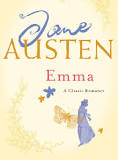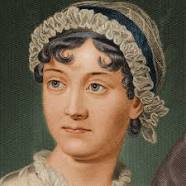Emma Page #39
Emma, by Jane Austen, is a novel about youthful hubris and the perils of misconstrued romance. The story takes place in the fictional village of Highbury and the surrounding estates of Hartfield, Randalls, and Donwell Abbey and involves the relationships among individuals in those locations consisting of "3 or 4 families in a country village". The novel was first published in December 1815 while the author was alive, with its title page listing a publication date of 1816. As in her other novels, Austen explores the concerns and difficulties of genteel women living in Georgian–Regency England; she also creates a lively comedy of manners among her characters and depicts issues of marriage, gender, age, and social status.
“You seem determined to think ill of him.” “Me!--not at all,” replied Mr. Knightley, rather displeased; “I do not want to think ill of him. I should be as ready to acknowledge his merits as any other man; but I hear of none, except what are merely personal; that he is well-grown and good-looking, with smooth, plausible manners.” “Well, if he have nothing else to recommend him, he will be a treasure at Highbury. We do not often look upon fine young men, well-bred and agreeable. We must not be nice and ask for all the virtues into the bargain. Cannot you imagine, Mr. Knightley, what a sensation his coming will produce? There will be but one subject throughout the parishes of Donwell and Highbury; but one interest--one object of curiosity; it will be all Mr. Frank Churchill; we shall think and speak of nobody else.” “You will excuse my being so much over-powered. If I find him conversable, I shall be glad of his acquaintance; but if he is only a chattering coxcomb, he will not occupy much of my time or thoughts.” “My idea of him is, that he can adapt his conversation to the taste of every body, and has the power as well as the wish of being universally agreeable. To you, he will talk of farming; to me, of drawing or music; and so on to every body, having that general information on all subjects which will enable him to follow the lead, or take the lead, just as propriety may require, and to speak extremely well on each; that is my idea of him.” “And mine,” said Mr. Knightley warmly, “is, that if he turn out any thing like it, he will be the most insufferable fellow breathing! What! at three-and-twenty to be the king of his company--the great man--the practised politician, who is to read every body's character, and make every body's talents conduce to the display of his own superiority; to be dispensing his flatteries around, that he may make all appear like fools compared with himself! My dear Emma, your own good sense could not endure such a puppy when it came to the point.” “I will say no more about him,” cried Emma, “you turn every thing to evil. We are both prejudiced; you against, I for him; and we have no chance of agreeing till he is really here.” “Prejudiced! I am not prejudiced.” “But I am very much, and without being at all ashamed of it. My love for Mr. and Mrs. Weston gives me a decided prejudice in his favour.” “He is a person I never think of from one month's end to another,” said Mr. Knightley, with a degree of vexation, which made Emma immediately talk of something else, though she could not comprehend why he should be angry. To take a dislike to a young man, only because he appeared to be of a different disposition from himself, was unworthy the real liberality of mind which she was always used to acknowledge in him; for with all the high opinion of himself, which she had often laid to his charge, she had never before for a moment supposed it could make him unjust to the merit of another. VOLUME II CHAPTER I Emma and Harriet had been walking together one morning, and, in Emma's opinion, had been talking enough of Mr. Elton for that day. She could not think that Harriet's solace or her own sins required more; and she was therefore industriously getting rid of the subject as they returned;--but it burst out again when she thought she had succeeded, and after speaking some time of what the poor must suffer in winter, and receiving no other answer than a very plaintive--“Mr. Elton is so good to the poor!” she found something else must be done. They were just approaching the house where lived Mrs. and Miss Bates. She determined to call upon them and seek safety in numbers. There was always sufficient reason for such an attention; Mrs. and Miss Bates loved to be called on, and she knew she was considered by the very few who presumed ever to see imperfection in her, as rather negligent in that respect, and as not contributing what she ought to the stock of their scanty comforts. She had had many a hint from Mr. Knightley and some from her own heart, as to her deficiency--but none were equal to counteract the persuasion of its being very disagreeable,--a waste of time--tiresome women--and all the horror of being in danger of falling in with the second-rate and third-rate of Highbury, who were calling on them for ever, and therefore she seldom went near them. But now she made the sudden resolution of not passing their door without going in--observing, as she proposed it to Harriet, that, as well as she could calculate, they were just now quite safe from any letter from Jane Fairfax. The house belonged to people in business. Mrs. and Miss Bates occupied the drawing-room floor; and there, in the very moderate-sized apartment, which was every thing to them, the visitors were most cordially and even gratefully welcomed; the quiet neat old lady, who with her knitting was seated in the warmest corner, wanting even to give up her place to Miss Woodhouse, and her more active, talking daughter, almost ready to overpower them with care and kindness, thanks for their visit, solicitude for their shoes, anxious inquiries after Mr. Woodhouse's health, cheerful communications about her mother's, and sweet-cake from the beaufet--“Mrs. Cole had just been there, just called in for ten minutes, and had been so good as to sit an hour with them, and she had taken a piece of cake and been so kind as to say she liked it very much; and, therefore, she hoped Miss Woodhouse and Miss Smith would do them the favour to eat a piece too.” The mention of the Coles was sure to be followed by that of Mr. Elton. There was intimacy between them, and Mr. Cole had heard from Mr. Elton since his going away. Emma knew what was coming; they must have the letter over again, and settle how long he had been gone, and how much he was engaged in company, and what a favourite he was wherever he went, and how full the Master of the Ceremonies' ball had been; and she went through it very well, with all the interest and all the commendation that could be requisite, and always putting forward to prevent Harriet's being obliged to say a word. This she had been prepared for when she entered the house; but meant, having once talked him handsomely over, to be no farther incommoded by any troublesome topic, and to wander at large amongst all the Mistresses and Misses of Highbury, and their card-parties. She had not been prepared to have Jane Fairfax succeed Mr. Elton; but he was actually hurried off by Miss Bates, she jumped away from him at last abruptly to the Coles, to usher in a letter from her niece. “Oh! yes--Mr. Elton, I understand--certainly as to dancing--Mrs. Cole was telling me that dancing at the rooms at Bath was--Mrs. Cole was so kind as to sit some time with us, talking of Jane; for as soon as she came in, she began inquiring after her, Jane is so very great a favourite there. Whenever she is with us, Mrs. Cole does not know how to shew her kindness enough; and I must say that Jane deserves it as much as any body can. And so she began inquiring after her directly, saying, 'I know you cannot have heard from Jane lately, because it is not her time for writing;' and when I immediately said, 'But indeed we have, we had a letter this very morning,' I do not know that I ever saw any body more surprized. 'Have you, upon your honour?' said she; 'well, that is quite unexpected. Do let me hear what she says.'”
Translation
Translate and read this book in other languages:
Select another language:
- - Select -
- 简体中文 (Chinese - Simplified)
- 繁體中文 (Chinese - Traditional)
- Español (Spanish)
- Esperanto (Esperanto)
- 日本語 (Japanese)
- Português (Portuguese)
- Deutsch (German)
- العربية (Arabic)
- Français (French)
- Русский (Russian)
- ಕನ್ನಡ (Kannada)
- 한국어 (Korean)
- עברית (Hebrew)
- Gaeilge (Irish)
- Українська (Ukrainian)
- اردو (Urdu)
- Magyar (Hungarian)
- मानक हिन्दी (Hindi)
- Indonesia (Indonesian)
- Italiano (Italian)
- தமிழ் (Tamil)
- Türkçe (Turkish)
- తెలుగు (Telugu)
- ภาษาไทย (Thai)
- Tiếng Việt (Vietnamese)
- Čeština (Czech)
- Polski (Polish)
- Bahasa Indonesia (Indonesian)
- Românește (Romanian)
- Nederlands (Dutch)
- Ελληνικά (Greek)
- Latinum (Latin)
- Svenska (Swedish)
- Dansk (Danish)
- Suomi (Finnish)
- فارسی (Persian)
- ייִדיש (Yiddish)
- հայերեն (Armenian)
- Norsk (Norwegian)
- English (English)
Citation
Use the citation below to add this book to your bibliography:
Style:MLAChicagoAPA
"Emma Books." Literature.com. STANDS4 LLC, 2025. Web. 11 Jan. 2025. <https://www.literature.com/book/emma_29>.




Discuss this Emma book with the community:
Report Comment
We're doing our best to make sure our content is useful, accurate and safe.
If by any chance you spot an inappropriate comment while navigating through our website please use this form to let us know, and we'll take care of it shortly.
Attachment
You need to be logged in to favorite.
Log In